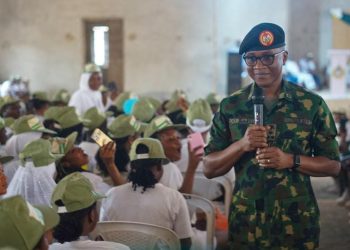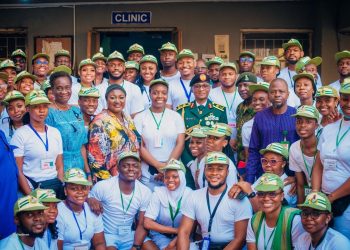By Nkechi Eze
In a bid to promote positive awareness by educating students on the negative impacts of corruption and encourage responsible behavior, the Kano Zonal Director of the Economic and Financial Crimes Commission, EFCC, Commander of the EFCC, CE Ibrahim Shazali has called on institutions of higher learning across the country, to introduce anti-corruption courses as a core requirement for all first-year students, in order to equip undergraduates with the necessary knowledge and understanding about the pervasive issue of corruption in the country and the significant roles they can play in combating it.
Shazali made the call in Kano during a courtesy visit from Professor Mukhtar Attiku Kurawa, Vice-Chancellor of Yusuf Maitama Sule University. He emphasized the importance of educating undergraduates about the dangers of corruption, stating that arming them with the right information would enable them to join forces with the Economic and Financial Crimes Commission (EFCC) in combating corruption.

According to Shazali, “Given the alarming rate of corrupt practices that continue to hinder Nigeria’s socio-economic growth and stability, the EFCC believes that the educational sector holds a vital responsibility in shaping the moral fabric of future leaders. An anti-corruption course will not only enlighten students about the detrimental effects of corruption but will also instill values of integrity, accountability, and patriotism”.

Speaking further, the Kano Director explained the rationale of his proposal, pointing out that, “I think it is important to introduce anti-corruption studies in the university system and make it a prerequisite alongside general studies at 100 level, for every student to have an idea about corruption and what it takes to be of good character”
He further disclosed that the EFCC has already established Integrity Clubs in primary and secondary schools, as well as Zero Tolerance for Corruption Clubs in tertiary institutions, as part of its public enlightenment and engagement campaigns. These clubs aim to educate students about the dangers of corruption and promote integrity among young Nigerians. The EFCC plans to extend this initiative to Yusuf Maitama University, according to its recent announcement.
On the issue of corruption, Shazali enjoined the VC to be diligent, especially in the bursary and procurement departments of his University as those two departments are more vulnerable to corruption according to facts available to the EFCC.
Earlier in his opening remark, Kurawa disclosed that his University has recently established the Department of Cyber Security to address the pressing need for skilled professionals in the ever-evolving field of information technology security. “The proliferation of cyber threats, data breaches, and online fraud pose significant challenges to individuals, businesses, and government institutions in Nigeria and around the world”, he said.
He sought the establishment of a forensic laboratory for equipping students with practical skills and the necessary tools to combat cyber-related challenges, urging the Kano Command of the EFCC to come to the aid of the University to meet the need. Shazali assured him of possible support but equally urged him to reach out to international donor agencies who are keen on fighting corruption for assistance.













